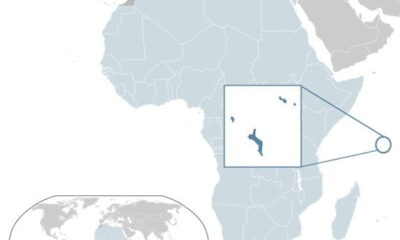

Environment
Zambia elephant population tenth of 1981 numbers: first pan-African census in over 40 years
The Zambian Wildlife Authority (ZAWA) is conducting aerial surveys of elephants and other large herbivores in three of Zambia’s national parks. The Nature Conservancy is facilitating the training of ZAWA ecologists on data collection and organizing the approximately 258 hours of flight time over the course of four weeks.
“Aerial surveys are an important part of Zambia’s wildlife management strategy. You can’t effectively manage wildlife programs unless you know how many animals you have. An accurate count is the starting point and the most important piece in a broader wildlife management strategy,” said Eric T. Schultz, U.S. Ambassador to the Republic of Zambia
The results of this survey have implications far beyond Zambia’s borders, especially since this area lies in a region that is a stronghold for the African elephant. Funded by philanthropist Paul G. Allen, this endeavour is part of a continent-wide effort called the Great Elephant Census. This count will be the first pan-African census in over 40 years. Researchers in 20 countries will use a standardized method of data collection to create an up-to-date picture of the status of African elephants. The insights revealed through this survey can help create tailored management plans to more effectively protect elephants and deploy the limited conservation resources and dedicated rangers where they will be able to make the most impact.
“Wildlife is one of Zambia’s most valuable renewable resources and it needs to protect it because without it there is no tourism. Tourism is one of the industries that has a huge potential to contribute to Zambia’s economic growth; without these animals, there is no tourism,” said Ambassador Schultz.
By now, most people know that the African Elephant is in danger. Increasing demand for ivory from places like China, the Philippines and even the United States have sent elephant numbers plummeting recent decades.
“In 1981, Zambia alone had an estimated 160,000 elephants. Today their number is likely one tenth of that. It’s critical to deploy Zambia’s limited conservation resources and dedicated rangers where they will be able to make the most impact,” said David Banks, Africa Managing Director, The Nature Conservancy.
Photo Credit – Kenneth K. Coe, National Geographic


 Features11 months ago
Features11 months agoEco-Friendly Cryptocurrencies: Sustainable Investment Choices

 Energy11 months ago
Energy11 months agoThe Growing Role of Solar Panels in Ireland’s Energy Future

 Energy10 months ago
Energy10 months agoGrowth of Solar Power in Dublin: A Sustainable Revolution

 Energy10 months ago
Energy10 months agoRenewable Energy Adoption Can Combat Climate Change
























